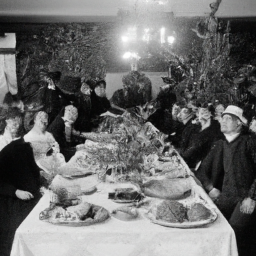Thanksgiving, a beloved holiday in the United States, holds a special place in the hearts of millions of Americans. It is a time when families and friends gather together to express gratitude, share a bountiful feast, and create lasting memories. However, many are unaware of the significant role played by President Abraham Lincoln in making Thanksgiving a national holiday.
In the midst of the Civil War, President Lincoln sought to unite the nation and promote a sense of gratitude and unity among its citizens. On October 3, 1863, he issued a Presidential Proclamation, officially designating the last Thursday of November as a national day of Thanksgiving.
The Proclamation highlighted the importance of coming together as a nation, acknowledging the blessings of the year, and expressing gratitude for them. It emphasized the need for unity and healing during a time when the country was experiencing deep divisions. President Lincoln recognized that even amidst the chaos of war, it was crucial to pause and reflect on the blessings that still existed.
The tradition of Thanksgiving, rooted in the early harvest celebrations of the Pilgrims and Native Americans, had been observed by various states for many years prior to Lincoln's declaration. However, it was his Proclamation that solidified the holiday's national status, bringing it under the unifying umbrella of the federal government.
President Lincoln's decision to establish Thanksgiving as a national holiday was met with widespread support and appreciation. It provided Americans with a day to set aside their differences and focus on gratitude, family, and community. It also served as a reminder of the resilience and strength of the American spirit during even the most challenging times.
Since then, Thanksgiving has become an integral part of American culture, with traditions such as turkey pardoning, parades, and football games taking center stage. The holiday has evolved, but its core essence remains the same – a day to express gratitude, cherish loved ones, and celebrate the abundance of the harvest season.
Every year, on the fourth Thursday of November, families across the nation come together to create their own unique Thanksgiving traditions. From preparing a delicious feast to sharing stories of gratitude, the holiday serves as a reminder of the importance of appreciating life's blessings.
In conclusion, it was the visionary leadership of President Abraham Lincoln that transformed Thanksgiving into a national holiday. His Presidential Proclamation brought the nation together during a tumultuous time, emphasizing the value of gratitude and unity. As we gather around the Thanksgiving table each year, let us remember the historical significance behind this cherished holiday and express our gratitude for the enduring traditions it represents.
